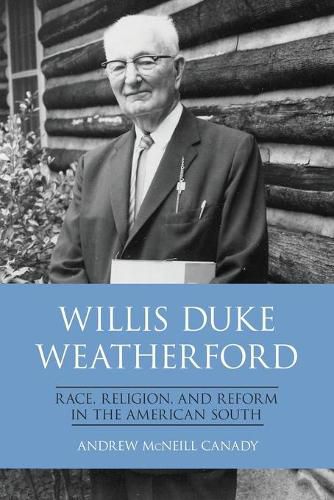Readings Newsletter
Become a Readings Member to make your shopping experience even easier.
Sign in or sign up for free!
You’re not far away from qualifying for FREE standard shipping within Australia
You’ve qualified for FREE standard shipping within Australia
The cart is loading…






At the turn of the twentieth century, few white, southern leaders would speak out in favor of racial equality for fear of being dismissed as too progressive. Willis Duke Weatherford (1875–1970), however, defied convention as one of the first prominent white southern liberals to dedicate his life to reforming the South’s social system, eliminating violence and injustice through education, and opening a dialogue among the affected groups. His energetic efforts led to a rise in progressive action in the region, though at times his own beliefs prevented him from advocating for absolute racial equality. As a result, historians debate Weatherford’s legacy: Was he a forward-thinking supporter of human rights or merely a moderate paternalist? In this comprehensive biography, Andrew McNeill Canady offers a reassessment of the influential educator’s life and work. Canady surveys Weatherford’s work with institutions such as the YMCA, Berea College, and Fisk University and illuminates his many efforts to foster dialogue among southerners of all races about religion, race relations, and Appalachia. He also examines Weatherford’s reluctance to challenge Jim Crow laws and the capitalist economy that contributed to the poverty of African Americans and the people of Appalachia, revealing the limitations that southern reformers faced and the often-difficult compromises they were forced to make. During a career that spanned from the Progressive Era to the civil rights movement, Weatherford was involved in virtually every significant southern liberal effort of his time. Past research has focused primarily on Weatherford’s early work, but Canady’s study is the first to investigate the full trajectory of his life and career. This overdue biography makes a significant contribution to literature on the long civil rights movement and the development of southern liberalism.
$9.00 standard shipping within Australia
FREE standard shipping within Australia for orders over $100.00
Express & International shipping calculated at checkout
At the turn of the twentieth century, few white, southern leaders would speak out in favor of racial equality for fear of being dismissed as too progressive. Willis Duke Weatherford (1875–1970), however, defied convention as one of the first prominent white southern liberals to dedicate his life to reforming the South’s social system, eliminating violence and injustice through education, and opening a dialogue among the affected groups. His energetic efforts led to a rise in progressive action in the region, though at times his own beliefs prevented him from advocating for absolute racial equality. As a result, historians debate Weatherford’s legacy: Was he a forward-thinking supporter of human rights or merely a moderate paternalist? In this comprehensive biography, Andrew McNeill Canady offers a reassessment of the influential educator’s life and work. Canady surveys Weatherford’s work with institutions such as the YMCA, Berea College, and Fisk University and illuminates his many efforts to foster dialogue among southerners of all races about religion, race relations, and Appalachia. He also examines Weatherford’s reluctance to challenge Jim Crow laws and the capitalist economy that contributed to the poverty of African Americans and the people of Appalachia, revealing the limitations that southern reformers faced and the often-difficult compromises they were forced to make. During a career that spanned from the Progressive Era to the civil rights movement, Weatherford was involved in virtually every significant southern liberal effort of his time. Past research has focused primarily on Weatherford’s early work, but Canady’s study is the first to investigate the full trajectory of his life and career. This overdue biography makes a significant contribution to literature on the long civil rights movement and the development of southern liberalism.